Many students blogging?
Why not start one of your own!
Blogging is a great way to express yourself and share your thoughts with the world.
It has many benefits, such as getting you more organized, teaching you new blogging skills, and allowing you to make friends from all over the world.
But how do you know which blogging platform to use?
What should be included in a blog post? How do I get started on my first blog post?
These are questions that we will answer in this article!
We will discuss nine blogging examples (including inspirational classroom and personal blogs) and inspect what dos and don’ts work when creating the best student blogs.
Table of Contents
- Blogging for Students
- The Dos and Don’ts of Student Blogs
- Blogging Platform
- Why do educators use student blogs?
- Promotion of Self-Expression
- Student Blog Examples
- Assigning and Assessing Student Blogs
- Blogging & Writing Tools
- Ideas for content
- About Edublogs CampusPress and WordPress
- The last thing you need to know about blog examples and how to use them
- Conclusion
Blogging for Students
Students around the world are blogging.
But how do you know which blog platform to use? What should be included in a blog post? How do I get started on my first blog?
It is essential to ask yourself these questions before starting your student blogging adventure.
This article will discuss how you can start or continue with an inspiring classroom and personal blogs that are goals for the best experience possible!
The Dos and Don’ts of Student Blogs
Do: choose the best platform for you- there are plenty of different blogging platforms (Tumblr, Blogger, Blogspot) that all have their pros and cons.
Do: organize your blog well- organizing your blog will allow you to quickly find information like school projects, work deadlines, or articles you need later on.
Do: show your personality- blogging is a great way to share your interests and quirks with the world!
Don’t: take things too seriously- it’s important to remember that blogging can be fun!
Don’t make your blog inaccessible- if you want people to read it, make sure it’s not a private blog.
Don’t: over-complicate your blog post content by including too many lists or bullet points unnecessary.
Blogging Platform
There are tons of different blog platforms that you can use to share your thoughts with the world.
Some popular options include Tumblr, Blogger (owned by Google), and Blogspot.
Each platform has its pros and cons, so it is essential to do some research before deciding!
Organizing Your Posts Properly
Organizing your posts in a blog is one of the most critical steps.
If you feel overwhelmed, follow these three basic rules: organize by time (dates), organized by topic or project type, and organize from A to Z (alphabetically).
This will make it easy for you to find what you need when you need it!
Showing Your Personality in Blog Posts
Blogging is a great way to share your interests and quirks with the world.
If you have an idea for a post, go ahead and do it- there’s no harm if you blog what you want to blog about (make sure that nothing inappropriate gets posted)!
Why do educators use student blogs?
Blogs can be used as an ePortfolio or digital portfolio to maintain the learning of students.
As the age of students grows, their educators are increasingly likely to have them publish their school blogs.
Student learning and writing improve faster when each student has their blog as a critical component in blogging.
When students do their blog work in class, Sylvia Duckworth says that students feel motivated when they feel a sense – of ownership – about their blog.
Student motivation is higher as classes have blogs.
Students also need to be encouraged to learn to write on what it takes to improve on.
Promotion of Self-Expression
The blogs give them a chance to discover their thoughts and feelings about something.
Blogs offer students the opportunity to study subjects which they enjoy, such as fashion and art.
Students learn how to write about themselves and show off their thoughts.
A student can also see blogs from fellow students in similar situations or with similar activities.
Students need to produce good information because it makes them open to criticism, which gives them the need for writing well by other students for their success.
Student Blog Examples
1. The Student Blogger

The blog is written by a UK student and covers university life.
The blog is inspired by the student’s personal experience and offers advice on how to get through university life.
It also has a section that discusses careers for students after they have graduated from their degree program, which can be accessed at any time!
“This site applies only to students in UK universities.”- The Student Blogger.
This is an excellent blog for students currently in university or just graduated from their degree program.
The Student Blogger offers advice on how to get through university life, discusses the best careers after graduating, and personal experiences that you can’t find anywhere else!
2. Save The Student.

A critical aspect of students’ lives is money management, and the Save The Student blog focuses on this subject.
The blog discusses how to get the most out of your money and offers financial advice for students.
It also includes a section that explains different sources of funding, like scholarships and grants.
“This website is aimed at helping international students from low-income backgrounds.” – Save, The Student.
3. College Info Geek.
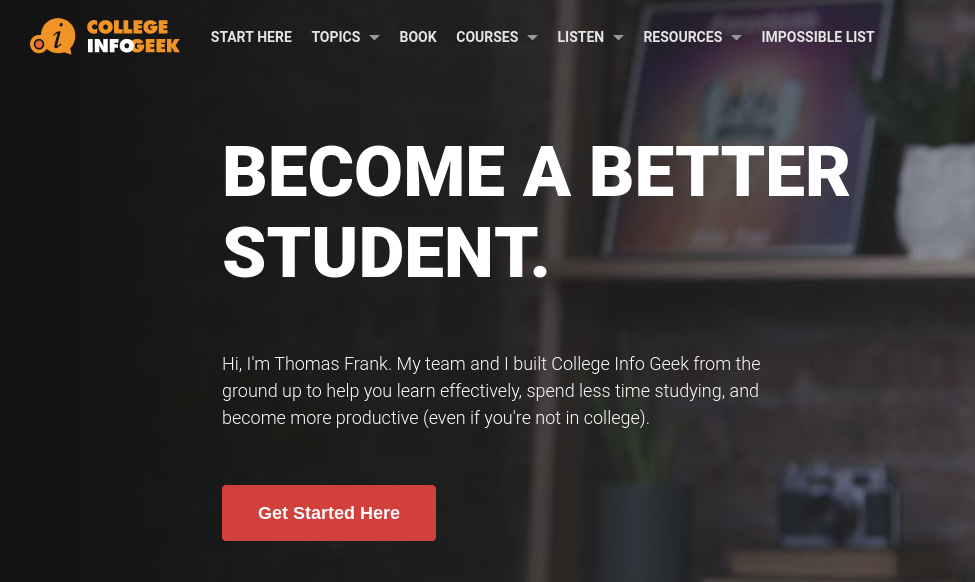
College Info Geek is a blog written by Thomas Frank that provides tips to help college students succeed.
One of the main goals of this blog is to help students with their college applications and application process.
It also includes blogs about scholarships, internships, resumes, interviews, resume templates, and more!
“College Info Geek’s mission is to make your life easier.”- College Info Geek.
If you have a lot going on in your life, College Info Geek’s blog is a great place to start!
It offers advice on college applications and the application process and blogs about scholarships, internships, resumes, interviews, and more.
College Info Geek’s goal is to make your life easier by providing helpful information in one easy-to-find location.
4. Stay Informed Group
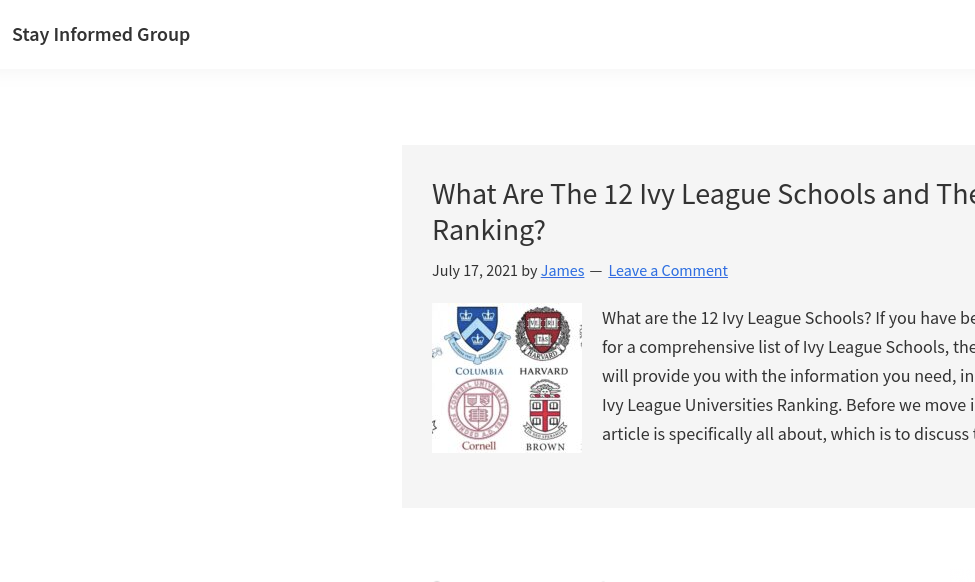
This blog has motivational posts for college students. It is a simple resource, but it offers precious information.
This blog is aimed at students who are struggling with the academic challenges of college.
“The Stay Informed Group provides content designed to help you stay motivated and improve your grades.”-Stay Informed Group.
If you need a boost or some motivation, this blog has it all!
It offers motivational content for those in their last year of college or those who are struggling with the academic challenges of college.
The Stay Informed Group provides content that’s designed to help you stay motivated and improve your grades.
5. Worcester Student Life
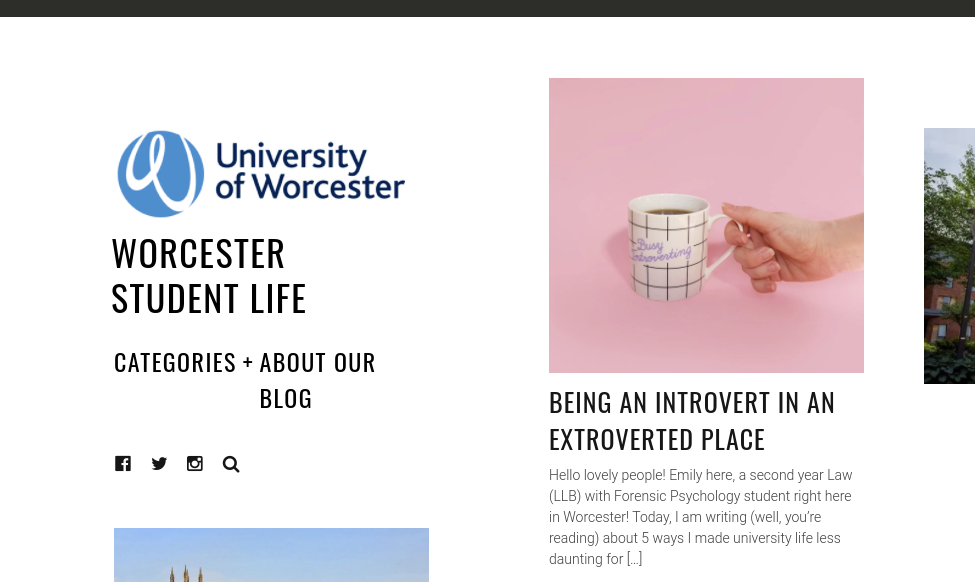
The blog Worcester Student Life is created by the students of the University of Worcester to share their experiences and tips.
It includes blogs about university life, events, and student culture.
“This site is designed to allow students from the University of Worcester to share their experiences with others.”-Worcester Student Life.
If you want some help navigating your way through college life or need a little advice, this blog has it all!
The blog includes blogs about university life, events, and student culture.
It is an excellent way for students from the University of Worcester to share their experiences with other people facing similar challenges.
6. The International Students Blog
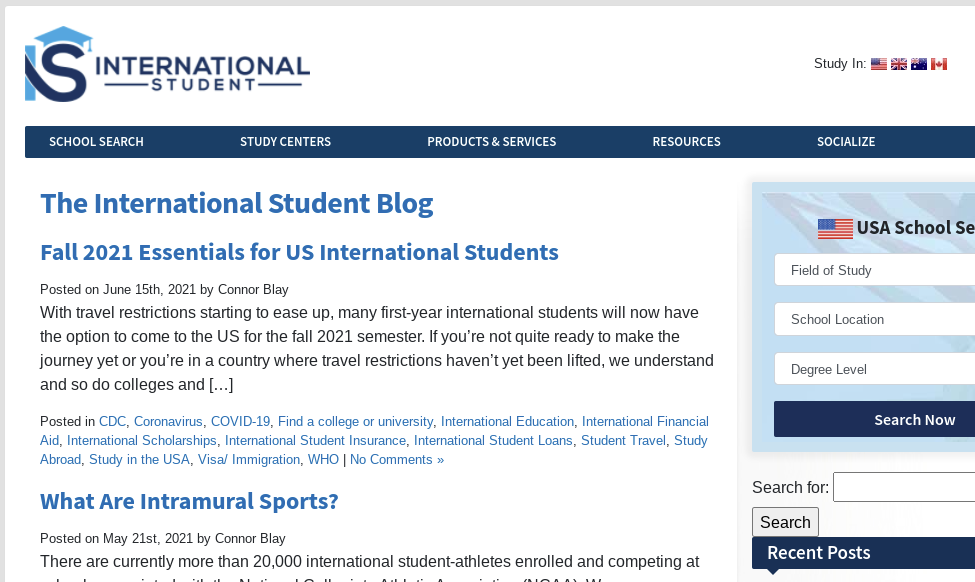
The blog is aimed at international students who are either studying abroad or intend to.
It includes blogs about the process, tips on living abroad, and even a free eBook.
“This blog is designed to inform international students of their rights.”-International Students Blog.
The International Student’s blog has it all! It offers information for those interested in studying abroad and advice on how to live life once you study abroad.
If you are interested in studying abroad or have already studied abroad, this blog is perfect for you!
7. StudentLife Network Blog
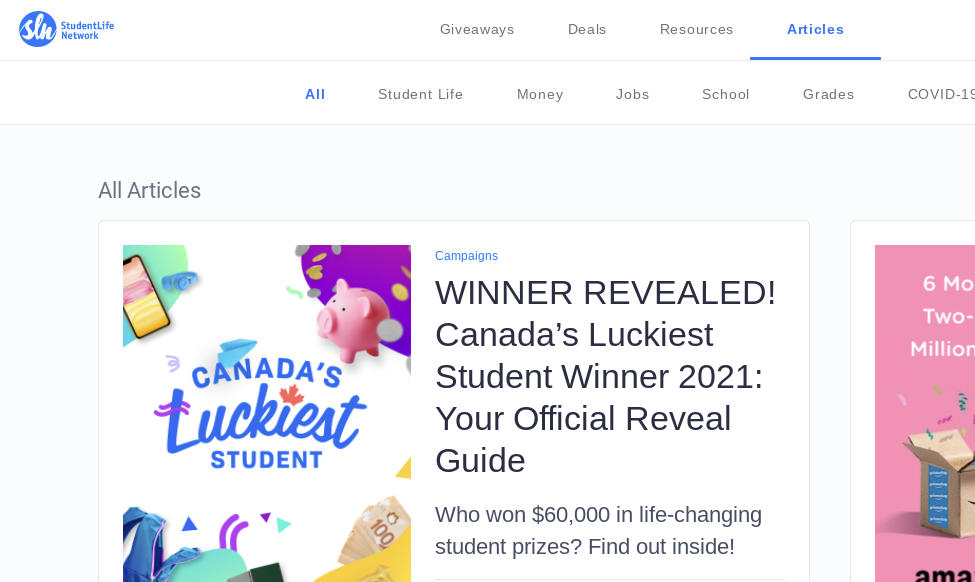
StudentLife Network is an educational website with information about schools for Canadian students.
The blog has posts with information about studying, scholarships, and jobs.
“This website provides students with the resources they need to succeed.”-StudentLife Network.
If you are a student looking for some help in your studies or career path, this is the place!
It includes content on everything from internships to getting university work done.
The StudentLife Network blog has posts with information on studying, scholarships and jobs.
8. The Student Newspaper

This is the oldest student newspaper in Europe.
The blog posts are all about life at university.
If you want to learn more about what it’s like on campus, this is an excellent source of information!
It includes content that deals with everything from student culture to life at the dorms.
9. Student Privacy Compass
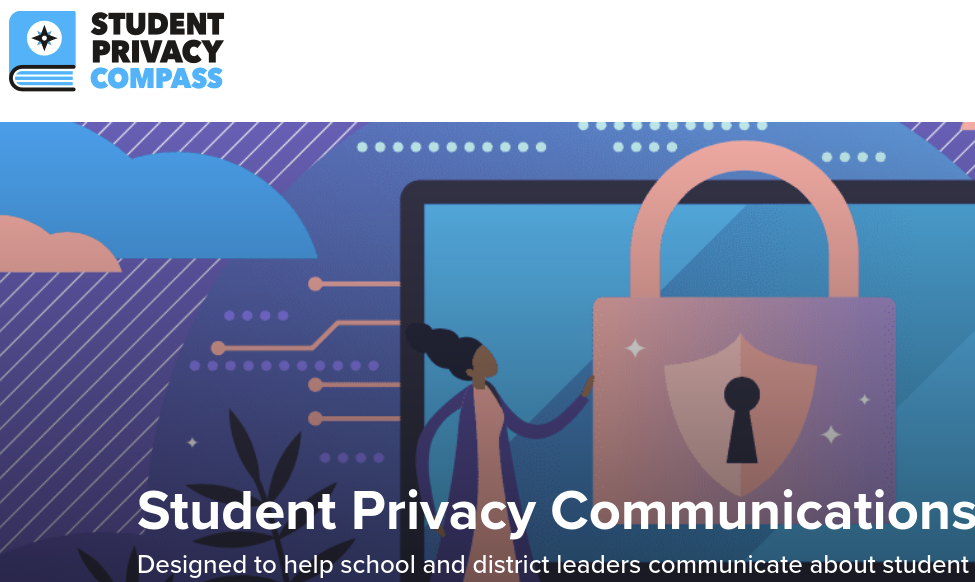
As a student, privacy is vital.
The Student Privacy Compass blog has been established to help you achieve that.
The Student Privacy Compass blog has it all!
It offers advice on how you can keep your personal information private, as well as tips for those who already have their online identity.
If you are a student or know someone who is, this blog will help you keep your personal information private.
The Stay Informed Group provides content designed to help you stay motivated and improve your grades.
Assigning and Assessing Student Blogs
A student blog would be a long-term project in which students will develop an idea and develop it as they are prepared, putting in the final blog that the student should be graded.
This would be a higher-level assignment.
A student blog could also be seen as an assessment, where students are assessed based on their ability to produce content for the class and put it in a readable and exciting medium for others (i.e., blogging).
This can occur over one time or throughout the semester, depending on the professor’s personal preference.
Blogging is a form of writing and should be graded based on the criteria for that type of assignment, not by some other assessment criteria (i.e., quizzes).
If it is an assessment blog, then grading should occur as if it were any other essay or paper. It would also need to have a grade range.
Blogging & Writing Tools
In my First Cool Tools lessons, you build your blog using Edublogs or Blogging.
For your younger students setting up a school, the account could allow you to create and manage accounts for everyone.
Vlogging can be an excellent way for the students to learn to speak and to present information.
To store video, YouTube is a popular platform.
And many Blogging platforms mentioned below will allow video embedded.
Flipgrid is an easy-to-use platform for video blogs.
It has a set of features designed for teachers, including quizzes and surveys.
With this platform, you can create collaborative blogs with students from around the world or within your classroom.
Check it out! It is free to sign up.
Ideas for content
Six ways students can make a collection of blog content.
This “content” is often written but – in some cases – is another type of medium.
The school can make these sites with the student’s permission and reach a wider audience.
About Edublogs CampusPress and WordPress
Some teachers build websites through the internet using WordPress.org or WordPress.com.
Edublogs provides a blogging forum based solely on learning education and additional support and safety.
CampusPress is a platform of WordPress to integrate with other educational institutions such as a whole – school – university.
CampusPress provides the same powerful features as EdUBLOG but has many features like individual branding.
Learn what a WordPress blog is about.
For more information about CampusPress.com using and other educational institutions, visit [Link] for more information.
The last thing you need to know about blog examples and how to use them
A blog can be a huge or tiny website run by a corporate enterprise.
They may also not be operated by the same person.
Even if you’re thinking about blogging, you can try out an unpaid blog site until you eventually feel comfortable with it.
I especially enjoy blog posts because I can help others moms with their little business by making some money.
Conclusion
There are many different types of blogs that you can create for your class or personal use.
We’ve provided a few examples, so hopefully, this blog post will help inspire you to start writing!
Which type of blog do you want to write?

